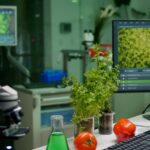The Future of Agrochemicals: Driving Innovation and Sustainable Farming
The Future of Agrochemicals: Innovations Shaping Modern Farming
Agriculture is undergoing a technological transformation, and agrochemicals are evolving to meet the demands of modern farming. Innovations in agrochemicals are focusing on sustainability, efficiency, and environmental safety, making farming more productive and less harmful.
Key Innovations in Agrochemicals
- Bio-Based Agrochemicals: Biopesticides and biofertilizers derived from natural organisms are gaining popularity due to their eco-friendly nature.
- Nanotechnology in Fertilizers: Nano-fertilizers improve nutrient absorption and reduce wastage, making them highly efficient.
- AI & Precision Agriculture: Data-driven decision-making is enabling the precise application of agrochemicals, reducing excessive use and costs.
- Slow-Release Pesticides: These innovative formulations release active ingredients gradually, providing long-term pest protection.
- Climate-Resilient Chemicals: Agrochemicals designed to withstand extreme weather conditions are helping farmers adapt to climate change.
Challenges & Future Outlook
While these innovations offer immense potential, challenges such as high R&D costs, regulatory approvals, and farmer awareness must be addressed. The future of agrochemicals lies in striking a balance between productivity and environmental responsibility.
With continuous advancements, agrochemicals will play a pivotal role in transforming Indian agriculture, ensuring food security while promoting sustainability.
The Role of Agrochemicals in Sustainable Farming
Sustainable farming is no longer just a choice — it is a necessity for ensuring food security and protecting the environment for future generations. Modern agrochemicals are being designed with this very goal in mind. They help farmers maximize yield while minimizing environmental damage, ensuring that agricultural growth and ecological balance go hand in hand.
By integrating bio-based fertilizers, microbial inoculants, and biostimulants, farmers can maintain soil fertility naturally. These innovations promote the growth of beneficial microbes, improve soil structure, and reduce dependency on harmful chemicals. As a result, sustainable farming practices contribute to long-term soil health and higher productivity without compromising ecosystem integrity.
Advancements Driving Sustainable Farming
Agrochemical research is rapidly evolving to align with the principles of sustainable farming. Here are some ways innovations are supporting this green revolution:
Smart Formulations: Controlled-release fertilizers and encapsulated pesticides reduce excessive application and nutrient loss, leading to more efficient and sustainable use.
Digital Farming Tools: Drones, satellite imagery, and AI-driven analytics help in mapping nutrient deficiencies and monitoring pest infestations, ensuring agrochemicals are used precisely where needed.
Integrated Pest Management (IPM): Combining chemical, biological, and cultural control methods reduces resistance buildup in pests and minimizes the environmental footprint.
Green Chemistry: The development of biodegradable, low-toxicity agrochemicals is making farming safer for both crops and the planet.
These practices ensure that agrochemicals complement nature rather than disrupt it, driving agriculture toward a more sustainable farming model.
Sustainable Farming: Benefits Beyond Productivity
Adopting sustainable farming methods powered by next-generation agrochemicals offers a range of benefits beyond crop yield:
- Soil Conservation: Reduced chemical runoff and enhanced organic content preserve the fertility of farmland for future use.
- Water Efficiency: Precision application techniques minimize water contamination and reduce overall consumption.
- Climate Resilience: Innovative agrochemicals enable crops to better withstand drought, salinity, and temperature fluctuations.
- Economic Growth: Sustainable solutions reduce long-term costs, increase profitability, and open up new export opportunities for eco-conscious markets.
Empowering Farmers for a Sustainable Future
For widespread adoption, it is vital to empower farmers with the knowledge and tools needed for sustainable farming. Training sessions, field demonstrations, and collaborations between research institutions, agrochemical companies, and governments are crucial steps. Encouraging the use of eco-labeled products and offering incentives for sustainable practices can further accelerate the transition.
A Greener Tomorrow
The future of agriculture lies in innovation that respects nature. With the support of science-driven agrochemicals, sustainable farming can become the cornerstone of global food production. These advancements not only promise higher yields but also a cleaner environment and a healthier planet.
As technology continues to advance, agrochemicals will no longer be seen merely as crop protection tools but as essential partners in building a sustainable, resilient, and prosperous agricultural ecosystem. The journey toward sustainable farming is a collective effort — one that unites farmers, industries, and consumers in shaping the future of global food security.







